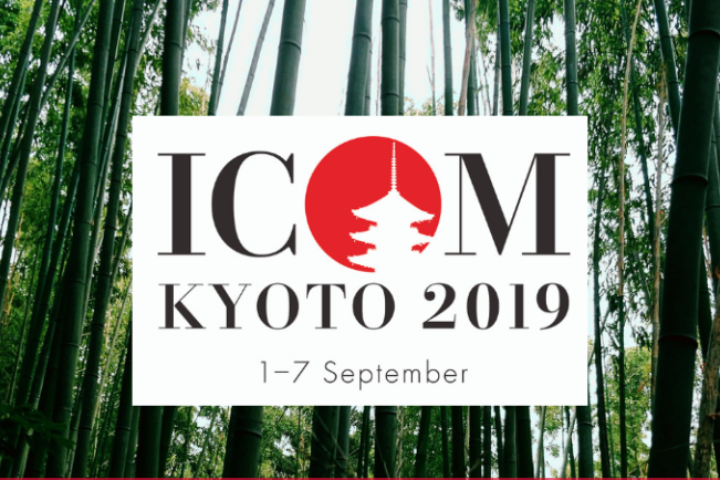April 10, 2019
[KYOTO 2019] CALL FOR PRESENTATIONS: How Far Can We Come with Tradition? Shaping the Future Call for papers

CALL FOR PRESENTATIONS
(PAPERS/PANEL DISCUSSIONS/PECHA-KUCHA)
How Far Can We Come with Tradition? Shaping the Future
Deadline for submission 19 April 2019
The international committees ICOM-CC and INTERCOM are together with the Regional Alliance ICOM SEE hosting a joint session at the triannual ICOM meeting 1-7 September 2019, Kyoto, Japan
The 2019 annual meeting of the three committees is part of the 25th General Conference of ICOM. Within the larger ICOM scheme ‘Museums as Cultural Hubs: The Future of Tradition’. Within this framework ICOM-CC, INTERCOM and ICOM-SEE are shaping a responsive program for the triennial, throughout the week under the theme: How Far Can We Come with Tradition? Shaping the Future. According to ICOM’s focus on a new museum definition, we want to put emphasis on current responsibilities and commitments of museums, and their challenges and visions for the future. It concerns the crisis of nature and sustainable, ethical, political, social and cultural challenges.
We want to draw on each committees experiences and works from the committees annual conferences to examine how museums, through their practice, research and museological and interdisciplinary practice can transform themselves and the work of museums – both within the fields they work with as well as how they work. We invite you to join us in Kyoto to reflect upon ‘How Far Can We Come with Tradition? Shaping the Future’ in the context of the museum. Proposals from diverse disciplinary backgrounds on the myriad ways that museums might work to care for tangible and intangible heritage are welcome. Can we together point out new megatrends and perhaps even discuss how they influence our museums already?
Submitting a proposal
ICOM-CC, INTERCOM and ICOM-SEE invites proposals for contribution to our one of these programs.
1. Paper presentation (15 minutes)
2. Panel discussion (30 minutes)
3. Pecha-Kucha presentation (6 minutes and 40 seconds)
In Pecha-Kucha (Japanese: ぺちゃくちゃ) presentations 20 slides are shown for 20 seconds each (6 minutes and 40 seconds in total). The architects Astrid Klein and Mark Dythamfirst developed this format in 2003 in Tokyo, to keep presentations concise and fast-paced (https://globaldigitalcitizen.org/how-to-make-great-presentations-with-pecha-kucha).
Proposals should include the information below in English
1. Which programme you are applying for (paper presentation/ panel discussion / Pecha-Kucha presentation)
2. Title of submitted paper presentation / panel discussion / Pecha-Kucha presentation
3. Abstract (do not exceed 200 words)
4. 5 keywords
5. Name of author
6. Institution of employment
7. Full address and email
8. Affiliation of ICOM committees
9. Support equipment required
10. All submissions must include a 100‐word bio for each presenter.
Please send proposals as soon as possible as a Word Document attachment to the e-mail: INTERCOM@kulturstyrelsen.dkwith the subject of “Kyoto proposal (your name)”.
The proposals will be evaluated by the chairs of ICOM.CC, ICOM-SEE and INTERCOM.
Acceptance of submissions will come by 6 May 2019.
To allow for the preparation for translation, complete papers with images must be submitted by 1 June 2019.
Exec. planning committee:
Anna Buelow , Chair of ICOM-CC
ICOM-CC is the International Committee for Conservation created in 1967 from a small group of conservation professionals. ICOM CC has now more than 2.000 members making it the largest international conservation organization and the largest of ICOMs international committees.
Goranka Horjan, Chair of ICOM-SEE
ICOM-SEE – the Regional Alliance for South-East Europe, which consists of members from 10 countries of the region can be seen as a decentralization process and further development of ICOM in the region. The main aim is to empower the regions with professional skills in order to secure equal participation of the member countries.
Ole Winther, Chair of INTERCOM
INTERCOM is the International Committee for Museum Management works toward the development of sound museum management throughout the world. The committee’s main concerns are the managerial aspects of policy formulation, legislation and resource management.